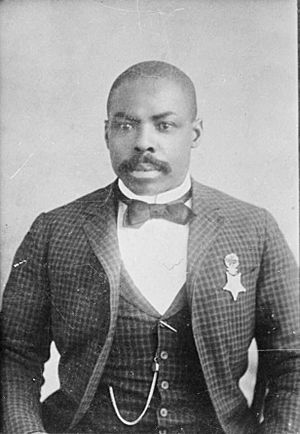Isaiah Mays facts for kids
Quick facts for kids
Isaiah Mays
|
|
|---|---|
 |
|
| Born | February 16, 1858 Carters Bridge, Virginia, U.S. |
| Died | May 2, 1925 (aged 67) Phoenix, Arizona, U.S. |
| Buried |
Arizona State Hospital Cemetery, Phoenix, Arizona
Arlington National Cemetery, Arlington, Virginia, U.S. |
| Allegiance | United States |
| Service/ |
United States Army |
| Years of service | 1881 – 1893 |
| Rank | Corporal |
| Unit | 24th Infantry Regiment |
| Battles/wars | American Indian Wars Wham Paymaster Robbery |
| Awards | Medal of Honor |
Isaiah Mays (born February 16, 1858 – died May 2, 1925) was a brave Buffalo Soldier in the United States Army. He received the Medal of Honor, which is America's highest award for military bravery. He earned this honor for his actions during an event called the Wham Paymaster Robbery in what was then the Arizona Territory.
Contents
A Life of Courage: Isaiah Mays
Isaiah Mays was born into slavery in Virginia. He joined the U.S. Army in September 1881. By May 1889, he was a corporal in Company B. This company was part of the 24th Infantry Regiment. They were stationed in the Arizona Territory.
The Wham Paymaster Robbery
On May 11, 1889, Corporal Mays was part of a group of soldiers. They were escorting Major Joseph W. Wham. Major Wham was carrying over $28,000 in gold and silver coins. This money was the payroll for soldiers at Fort Thomas.
The group was ambushed by bandits. The bandits had rolled a large boulder onto the road. This blocked the convoy's path. Sergeant Benjamin Brown led some men to move the boulder. Corporal Mays took a position at the back of the convoy.
The bandits then opened fire from a strong position above the road. The soldiers quickly found cover. Mays first fired back with his revolver. He was behind the convoy's escort wagon. This spot soon became too dangerous. He then joined Major Wham behind a rocky ledge.
The bandits tried to surround the soldiers. About 30 minutes into the fight, Mays took command. Sergeant Brown had become separated from the group. Mays told Major Wham their position was no longer safe. He decided to order his men to pull back. Major Wham later agreed this was the right choice.
Wham and Mays moved to a dry creek bed. It was about 300 yards from their first spot. Major Wham tried to get the soldiers to fight back. He wanted to get the payroll box. But he saw that eight of his eleven soldiers were hurt. This made it impossible to retake the money.
The bandits kept firing at the soldiers. They eventually came down the hill. They opened the lock box and took the money. After about an hour and a half, the bandits left. The battle was over.
Receiving the Medal of Honor
On February 19, 1890, Mays received the Medal of Honor. This was for his brave actions during the robbery. Sergeant Brown also received the Medal of Honor that day. Eight other soldiers earned a Certificate of Merit.
Eleven men were arrested for the robbery. Most were from a nearby community. Eight of them were tried for robbery. However, all of the accused were found not guilty. The stolen money was never found.
Life After Service and Final Resting Place
After leaving the Army in September 1893, Mays worked as a laborer. He lived in Arizona and New Mexico. In 1922, he asked for a government pension. But his request was denied.
He later entered a hospital in Phoenix. This hospital cared for people who were ill or in need. Isaiah Mays died there in 1925. He was sixty-seven years old. He was buried in the hospital's cemetery. His grave had only a small stone with a number.
In 2001, his grave marker was replaced. The new headstone was from the United States Department of Veterans Affairs. It showed his name, service history, and that he received the Medal of Honor.
Eight years later, in March 2009, his remains were moved. They were cremated and placed in a special urn. On May 29, 2009, Corporal Mays was reburied. He was laid to rest with full honors at Arlington National Cemetery. This was a fitting ceremony for a Medal of Honor recipient.
 | Stephanie Wilson |
 | Charles Bolden |
 | Ronald McNair |
 | Frederick D. Gregory |

